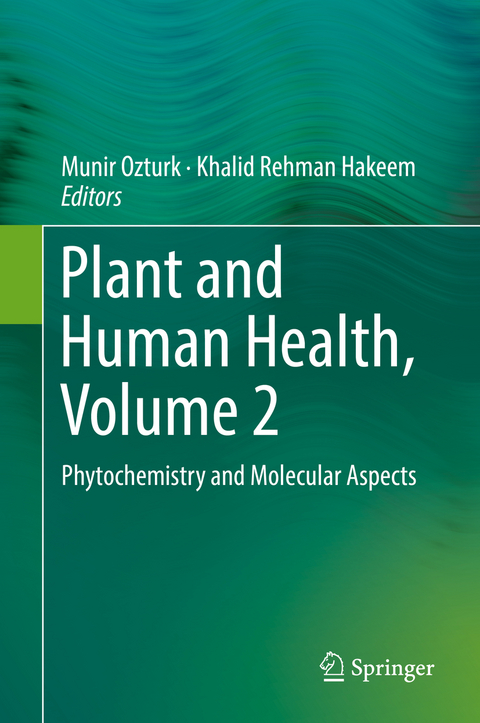
Plant and Human Health, Volume 2
Springer International Publishing (Verlag)
978-3-030-03343-9 (ISBN)
Research scientists should therefore arm themselves with the right tools and knowledge in order to harness the vast potentials of plant-based therapeutics. The main objective of Plant and Human Health is to serve as a comprehensive guide for this endeavor. Volume 1 highlights how humans from specific areas or cultures use indigenous plants. Despite technological developments, herbal drugs still occupy a preferential place in a majority of the population in the third world and have slowly taken roots as alternative medicine in the West. The integration of modern science with traditional uses of herbal drugs is important for our understanding of this ethnobotanical relationship. Volume 2 deals with the phytochemical and molecular characterization of herbal medicine. Specifically, It will focus on the secondary metabolic compounds which afford protection against diseases. Lastly, Volume 3 focuses on the physiological mechanisms by which the active ingredients of medicinal plants serve to improve human health. Together this three-volume collection intends to bridge the gap for herbalists, traditional and modern medical practitioners, and students and researchers in botany and horticulture.
Dr. Khalid Rehman Hakeem (PhD) is an Associate Professor at King Abdulaziz University, Jeddah, Saudi Arabia. He has completed his Ph.D. (Botany) from Jamia Hamdard, New Delhi, India in 2011. Dr. Hakeem has worked as Post Doctorate Fellow in 2012 and Fellow Researcher (Associate Prof.) from 2013-2016 at Universiti Putra Malaysia, Selangor, Malaysia. His speciality is in Plant Eco-Physiology, Molecular biology, Plant-Microbe-soil interactions, Medicinal plant research and Environmental Sciences and so far has edited and authored more than 25 books with Springer International, Academic Press (Elsevier) etc. He has also to his credit more than 110 research publications in peer reviewed international journals, including 40 book chapters in edited volumes with international publishers. Dr Hakeem is the recipient of many national and international awards and fellowships.
Foreword by Prof. Atta-ur-Rahman, UNESCO Science Laureate.- Antiepiletic Natural Products from Plants.- Plant-Derived Products and Health Care-Moroccon Story.- Pharmacological aspects of Phytodiversity from Bulgaria.- Resveratrol oligomers in Dipterocarpaceae.- Immunomodulating Activity of the Camel Prickle Water Extract.- Idiosyncratic toxicity of herbal product.- Recent advances in semi-mangrove natural products: source, chemistry, and bioactivities.- Medicinal plants of Malaysia: Phytochemistry and Molecular Biology.- Secondary Metabolism and Therapeutic Efficacy of Medicinal and Aromatic Plants.- New Compounds from Medicinal Plants of Bangladesh.- Xanthones from Medicinal Plants.- Flavonoids from Plants in Asia-Pacific.- Peroxygenases and Mushrooms.- New Flavanols, Saponins and Alkaloids from Vietnamese Plants.- Chemical and Biological, Anticancer, Antioxidant Activities of Vietnamese Plants.- Bioactlve Components from Different Plants in Rwanda.- Chemoprofiling-Bioefficacy of Herbal Drugs-Need for Standardization.- Lowering of Cholesterol Levels by Black Seed and Garlic.- Role of Biotechnology in the Medicinal and Aromatic Plants.- Innovation in Drug Discovery, Delivery and Pharmacy Practice.- Past, Present and Future Developments in Nutraceuticals.
| Erscheinungsdatum | 02.02.2019 |
|---|---|
| Zusatzinfo | XXVI, 697 p. 155 illus., 61 illus. in color. |
| Verlagsort | Cham |
| Sprache | englisch |
| Maße | 155 x 235 mm |
| Gewicht | 1244 g |
| Themenwelt | Naturwissenschaften ► Biologie ► Botanik |
| Schlagworte | Alternative medicine • medicinal and aromatic plants • molecular pharming • plant-based medicine • secondary metabolites |
| ISBN-10 | 3-030-03343-0 / 3030033430 |
| ISBN-13 | 978-3-030-03343-9 / 9783030033439 |
| Zustand | Neuware |
| Haben Sie eine Frage zum Produkt? |
aus dem Bereich


